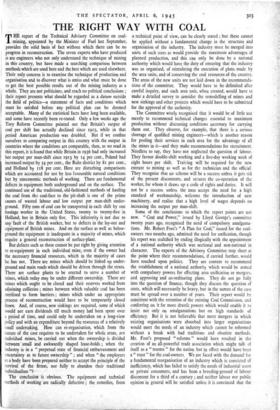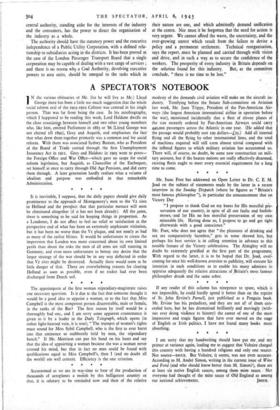THE RIGHT WAY WITH COAL
THE report of the Technical Advisory Committee on coal- mining, appointed by the Minister of Fuel last September, provides the solid basis of fact without which there can be no progress in reconstruction. The seven experts who have produced it are engineers who not only understand the technique of mining in this country, but have made a searching comparison between methods which are used here and the best which are used elsewhere. Their only concern is to examine the technique of production and organisation and to discover what is amiss and what must be done to get the best possible results out of the mining industry as a whole. They are not politicians, and reach no political conclusions ; their report presents what should be regarded as a datum outside the field of politics—a statement of facts and conditions which must be satisfied before any political plan can be deemed acceptable. Many of the statistical facts have long been available, and some have recently been re-stated. Only a few weeks ago the Tory Reform Committee pointed out that Britain's output of coal per shift has actually declined since 1915, while in that period American production was doubled. But if we confine ourselves to comparing output in this country with the output in countries where the conditions are comparable, then, as we read in this report, it is found that while Britain in 1936 had only increased her output per man-shift since 1913 by 14 per cent., Poland had increased output by 54 per cent., the Ruhr district by 81 per cent., and Holland by 118 per cent. Here are disturbing comparisons which are accounted for not by less favourable natural conditions but by uneconomic methods of working. There are fundamental defects in equipment both underground and on the surface. The continued use of the traditional, old-fashioned methods of hauling the coal from th2• coal-face to the pit-shaft is one of the prime causes of wasted labour and low output per man-shift under- ground. Fifty tons of coal can be transported in each shift by one haulage worker in the United States, twenty to twenty-five in Holland, but in Britain only five. This inferiority is not due to any fault of the British worker, but to defects in the lay-out and equipment of British mines. And on the surface as well as below- ground the equipment is inadequate in a majority of mines, which require a general reconstruction of surface-plant.
But defects such as these cannot be put right by giving attention to re-equipment in each individual mine, even if the owner had the necessary financial resources, which in the majority of cases he has not. There are mines which should be linked up under- ground and main roads which should be driven through the strata. There are surface plants to be erected to serve a number of mines, which today may be under different ownership. There are mines which ought to be closed and their reserves worked from adjoining collieries ; mines between which valuable coal has been sterilised to form barriers ; mines which under an appropriate process of reconstruction would have to be temporarily closed down. And, of course, new sinkings are required, some of which would not earn dividends till much money had been spent over a period of time, and could only be undertaken on a long-view policy and with an expenditure beyond the resources of a relatively small undertaking. How can re-organisation, which from the nature of the case requires to be undertaken for whole areas, not individual mines, be carried out when the ownership is divided between' small and awkwardly shaped lease holds ; when the industry is in a " perpetual state of financial embarrassment and uncertainty as to future ownership " ; and when " the employers as a body have been prepared neither to accept the principle of the survival of the fittest, nor fully to abandon their traditional individualism "?
The conclusion is obvious. The equipment and technical methods of working are radically defective ; the remedies, from a technical point of view, can be clearly stated ; but these cannot be applied without a fundamental change in the structure and organisation of the industry. The industry must be merged into units of such sizes as would provide the maximum advantages of planned production, and this can only be done by a national authority whiCh would have the duty of ensuring that the industry was so organised, of stimulating the execution of plans made by the area units, and of conserving the coal resources of the country.
The areas of the new units are not laid down in the recommenda- tions of the committee. They would have to be delimited after careful inquiry, and each area unit, when created, would have to make a detailed survey to consider the remodelling of mines and new sinkings and other projects which would have to be submitted for the approval of the authority.
The Committee wisely recognised that it would be of little use merely to recommend technical changes essential to maximum production without discussing conditions necessary for carrying them out. They observe, for example, that there is a serious shortage of qualified mining engineers—which is another reason for pooling their services in each area for the advantage of all the mines in it—and they make recommendations for recruitment. Needless to say, they have not neglected the question of labour. They favour double-shift working and a five-day working week of eight hours per shift. Training will be required for the new entrant to mining as well as for the technician and the official. They recognise that no scheme will be a success unless it gets rid of the present discontents, and secures the co-operation of the worker, for whom it draws up a code of rights and duties. It will not be a success unless the men accept the need for a high standard of workmanship, welcome the introduction of new machinery, and realise that a high level of wages depends on increasing the output per man-shift.
Some of the conclusions to which the report points are not new. " Coal and Power," issued by Lloyd George's committee twenty years ago, recognised the need of compulsory amalgama- tions. Mr. Robert Foot's " A Plan for Coal," issued for the coal- owners two months ago, admitted the need for unification, though his report was stultified by ending illogically with the appointment of a national authority which was sectional and non-national in character. The experts of the Advisory Committee stop short at the point where their recommendations, if carried further, would have touched upon politics. They are content to recommend the establishment of a national authority which would be armed with compulsory powers for effecting area unification or mergers, and approving and co-ordinating plans. They do not go fully into the question of finance, though they discuss the question of costs, which will necessarily be heavy, but in the nature of the case must be spread over a number of years. Their report would be consistent with the retention of the existing Coal Commission, and conferring on it far more drastic powers which would enable it to insist not only on amalgamations but on high standards of efficiency. But it is not believable that mere mergers in which existing organisations were absorbed into larger organisations would meet the needs of an industry which cannot be reformed without a break with bad traditions and obsolete methods. Mr. Foot's proposed " reforms " would have resulted in the creation of an all-powerful trade association which might talk of itself as a " trustee " for the nation but in effect would have been a " trust " for the coal-owners. We are faced with the demand for a fundamental reorganisation of an industry which is convicted of inefficiency, which has failed to satisfy the needs of industrial users of private consumers, and has been a breeding-ground of labour discontent for a third of a century ; and neither labour nor public opinion in general will be satisfied unless it is convinced that the central authority, standing alike for the interests of the industry and the consumers, has the power to direct the organisation of the industry as a whole.
The authority should have the statutory power and the executive independence of a Public Utility Corporation, with a defined rela- tionship to subsidiaries acting in the districts. It has been proved in the case of the London Passenger Transport Board that a single corporation may be capable of dealing with a vast range of services ; and there is no reason why a Coal Authority, devolving executive powers to area units, should be unequal to the tasks which in their nature are one, and which admittedly demand unification at the centre. Nor must it be forgotten that the need for action is very urgent. We cannot afford the waste, the uncertainty, and the ever-growing unrest which result from the failure to devise a policy and a permanent settlement. Technical reorganisation, says the report, must be planned and carried through with vision and drive, and in such a way as to secure the confidence of the workers. The prosperity of every industry in Britain depends on the solution found for this industry. But, as the committee conclude, " there is no time to be lost."



























 Previous page
Previous page